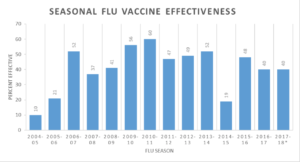It’s that time of the year where you might be asking yourself: Should I get the flu shot or not? Some people get one every year since they have never come down with the flu, so they assume it’s because they got their shot. Others get vaccinated as it may be strongly suggested by their doctor to do so or perhaps it is required by their employer. Some are skeptical and doubt whether it actually works while still others believe the flu shot may do more harm than good. This is one of many health topics that can be terribly confusing and even frightening if you believe the hype and hysteria that seems to accompany each oncoming flu season.

The fact of the matter is that whether or not you decide to get the flu shot is your choice…period! Our mission at Rebel Health is to present the necessary facts to help you make well-informed health decisions based on unbiased information that is provided without a profit motive.
So, let’s start with some basics.
How (in)effective is it? A study done by Rice University predicts that the 2018 flu vaccine will only have a 20% prevention rate. The Center for Disease Control estimates the general effectiveness of flu shots at between 40% and 60% “when most circulating flu viruses are well-matched to the flu vaccine.” So, on average you have a 50% chance of being protected from this year’s flu IF the manufacturers do a good job of matching the vaccine to the current virus. If they don’t do a good job, the CDC states: “During years when the flu vaccine is NOT well matched to circulating influenza viruses, it is possible that little or no benefit from flu vaccination may be observed.”
CDC: Effectiveness of Seasonal Flu Vaccines from the 2004-2018 Flu Seasons

Since influenza viruses are constantly evolving, public health officials essentially have to guess six months before flu season starts as to which strains are most likely to be dominant so that drug manufacturers can get to work. How good the guesswork and the manufacturers’ ability to match the vaccine to the influenza virus is critical AND difficult as you can see from the track record in the CDC chart above. To summarize…the effectiveness of the flu shot appears to be a COIN TOSS AT BEST.

What’s in it?
To make a below average bet on the flu shot working at all even worse consider that the vaccines can contain some very harmful ingredients including aluminum, antibiotics (anti= opposed to; biotic = life), chicken egg protein (not a mistype), formaldehyde, monosodium glutamate (MSG), and thimerosal, a mercury-containing chemical compound.
Brain-damaging mercury is a common preservative in flu shots. Exposure to this heavy metal can cause depression, cardiovascular disease, respiratory problems, memory loss, attention deficit disorder and a host of other serious ailments. Mercury is considered by the World Health Organization to be one of the top 10 chemicals of major public health concern. “Tests conducted via ICP-MS document mercury in Flulaval, a popular flu vaccine, at a shocking 51 parts per million, or over 25,000 times higher than the maximum contaminant level of inorganic mercury in drinking water set by the EPA.” This is disturbing, to say the least.
Are there side effects?
Yes, but the CDC claims they are generally mild and “go away on their own after a few days.” Common side effects from the flu shot include:
• Soreness, redness, and/or swelling from the shot
• A headache
• Fever
• Nausea
• Muscle aches
• The flu shot, like other injections, can occasionally cause fainting.
With any vaccine, look for any unusual conditions, such as a high fever, behavior changes, or signs of a severe allergic reaction after vaccination. Signs of a severe allergic reaction can include:
• Difficulty breathing
• Hoarseness or wheezing
• Swelling around the eyes or lips
• Hives
• Paleness
• Weakness
• A fast heartbeat or dizziness
• Life-threatening allergic reactions to the flu shot are rare. These signs would most likely happen within a few minutes to a few hours after the vaccine is given.
Bottom Line: Flu vaccines are not terribly effective, often contain toxic ingredients and come with mild to moderate side effects. Should you choose to still get the flu vaccine, make sure to ask your doctor for the preservative-free version. Eating a healthy diet of fruits, vegetables, nuts, and seeds, drinking quality water, getting solid sleep and exercising regularly contribute to a healthy body and a strong immune system. During this year’s flu season, we suggest a heightened focus on vitamin intake, especially Vitamin C (and Vitamin D for cold weather climate peeps) to get you through.
Yours in the Rebellion!
Disclaimer: The content of Rebel Health, either through this website, Rebel Health’s social media pages, or any other materials distributed by Rebel Health is intended to provide helpful and informative material. I am not a doctor, and as such cannot diagnose or treat any medical issues. Readers are advised to do their own research and make decisions in partnership with their healthcare provider. If you are pregnant, nursing, have a medical condition or are taking any medication, please consult your physician.






